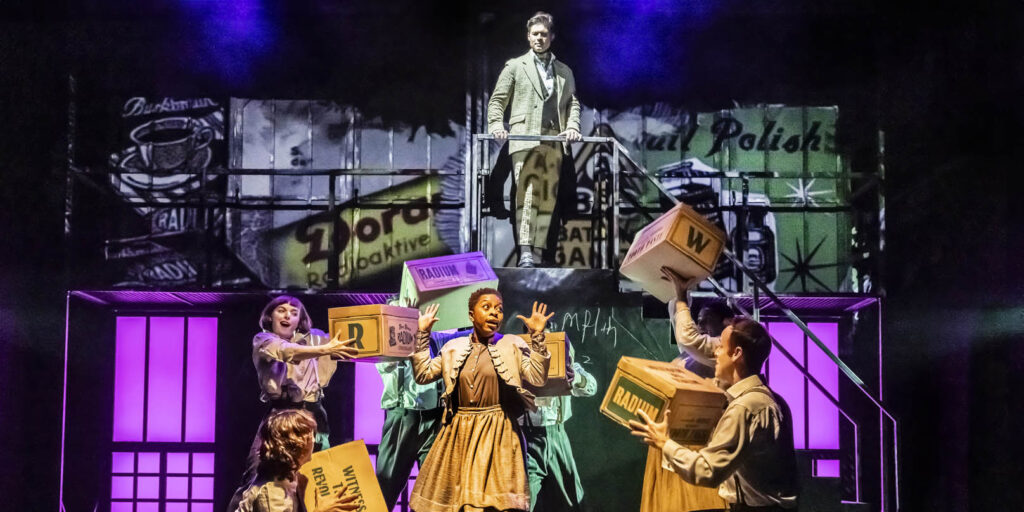
Marie Curie
Charing Cross Theatre
until 28th August 2024
Director: Sarah Meadows
Musical Composer: Jongyoon Choi
Books and lyrics: Seeun Choun
Produced by Byungwon Kang & LIVE corp
Marie Curie is a name renowned; a pioneer of medical discovery and recipient of two Nobel Prizes, Curie is an inspirational female figure in history, across the globe.
The Charing Cross Theatre is home to the newly transferred production of Seeun Choun’s book, previously produced and performed in Korea to rave reviews and multiple re-runs for over five years. Choun’s narrative follows Curie from her arrival in Paris in 1891, the only female science student at the Sorbonne, to her infamous discovery of a new chemical element, Radium. Whilst glorifying the progressive nature of medical discoveries, Choun exposes the mistakes and ignorance that, ultimately, caused the death of the world’s most renowned female scientist, Marie Curie.
As the lights went down, we were immediately plunged head-first into the events of Curie’s life through the medium of a diary; Lucy Young, playing Curie’s eldest daughter Irène, began to read Curie’s words, which where then physically realised on stage, as the set transported us to a world of discovery and opportunity.
Ailsa Davidson plays Marie Curie with an extreme drive and determination, indulging in emotions only when necessary, and finding moments of warmth and lightness when the subject matter became dark and consuming. Her voice is a stand-out, and she performed huge solos, notably ‘Another Name’, with a poised and mature manner. Chrissie Bhima, portraying Curie’s friend Anne Kowalska, was wonderfully animated, and brought a much needed humour to the piece and Thomas Josling was a brilliant Pierre Curie; grounded and honest, his portrayal felt the most natural to watch.
The whole cast did well, but I felt they were let down by the script. Scenes weren’t allowed time to settle on stage, as time leaps suddenly sprung into action, demonstrated by odd physical montages with lines dotted here and there to allude to the events we were quickly witnessing. It was confusing, and eventually disengaging. Certain moments were poignant, such as Marie and Pierre introduced as, ‘Pierre Curie and his wife, Marie Curie’, when accepting their Nobel Prize, highlighting the sexism that Marie was subject to, and Maya Kristal Tenenbaum performed a Polish prayer in a moving moment of grief. Movement, by Joanna Goodwin, was used a lot and whilst there was some great moments, such as the repetitive physicality of a laboratory experiment, most of the time the movement was distracting and stylistically jarring.
A key element of the production was of course, the music. Some songs were brilliant and I was impressed with the contrast in musical styles. ‘Radium Paradise’ in particular, led by Richard Meek as Ruben DeLong, was a breath of fresh air, exciting and captivating, as the ensemble moved smoothly across the ‘factory’ floor and a jingle-like composition had audiences tapping their feet and swaying along. Other songs such as ‘You’re the reason’, had beautiful harmonies and simple, effective melodies. However, for a show that was 1 hour and 40 mins in total, the amount of musical pieces became overwhelming. Songs started to sound similar and rhythms were altered by the addition of unnecessary lyrics and on-the-nose themes, such as the song ‘Line of Death’ which was performed by the ensemble portraying factory workers who died from radiation exposure. The music was used as a way to push forward the narrative, but in doing this again and again, the clever lyricism became irritating.
I do quickly want to say that the technical elements of the show were interesting; Matt Powell’s projection design was used to write certain diary entries and ongoing equations, which was a nice addition and Prema Mehta’s lighting designs, including the use of silhouettes, was brilliant and incredibly captivating.
Ruminating over my thoughts, I think the lasting perception is that the piece wasn’t allowed to breathe. Stillness was absent, which enabled a frantic feeling to seep off the stage and into the audience, confusing the narrative and over-powering the true, extraordinary, story of Marie Curie. Perhaps the piece is too clever for its own good, incorporating different musical styles, narrative mediums and fast-paced action which clash against one another and never seem to find a harmonious balance. However, as the final number rises to a climax, and the cast stand together filling the theatre with a rousing melody, you can’t help but reflect emotionally on the life and legacy of Marie Curie.
Reviewed by Lily Sitzia